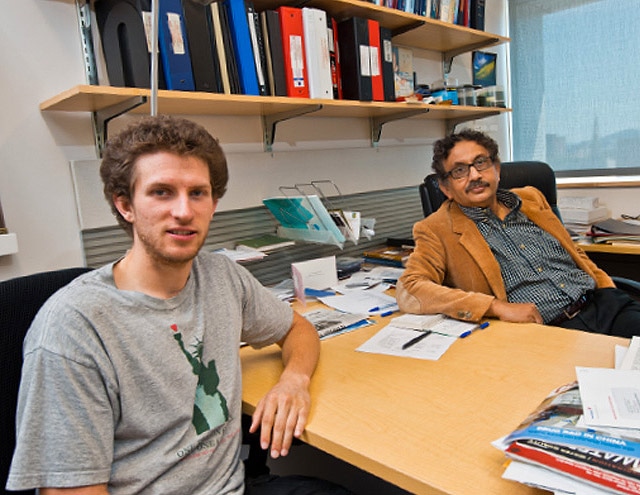Apr 22 2016
Zirconium, the 21st most abundant element in the world, is a stable and chemically innocuous metal. Nanoparticles of zirconium oxide, says Arup SenGupta, have adsorption properties that make them uniquely beneficial to human beings. They can remove four major toxins — arsenic, fluoride, phosphate and lead — from water.
 Arup SenGupta (right) and Mike German (left), P.C. Rossin Professor, Civil and Environmental Engineering, Chemical and Biomolecular Engineering. (Photos courtesy of Arup SenGupta)
Arup SenGupta (right) and Mike German (left), P.C. Rossin Professor, Civil and Environmental Engineering, Chemical and Biomolecular Engineering. (Photos courtesy of Arup SenGupta)
SenGupta, the P.C. Rossin Senior Professor in the department of civil and environmental engineering, and three of his students have used zirconium oxide nanoparticles to invent the world’s first filter capable of removing both fluoride and arsenic from groundwater.
The students are Surapol Padungthon, who received his Ph.D. in environmental engineering from Lehigh in 2013, and Mike German and Jinze Li, who are currently Ph.D. candidates in environmental engineering.
The filter materials, called HIX-NanoZr, are polymeric ion exchangers (IX) doped with zirconium oxide nanoparticles. The doping procedure, says SenGupta, plays a critical role in producing optimum hybrid particles that are robust and accessible to water while maintaining their integrity. In addition, HIX-NanoZr can be used and reused for many cycles without being wasted.
Last September, SenGupta and Padungthon were awarded a U.S. patent for the invention.
Nearly 400 million people in Asia and Africa drink groundwater that contains toxic levels of fluoride and arsenic. Exposure to excessive amounts of fluoride can cause skeletal fluorosis, which decreases the elasticity of bones, making them more prone to fracture and causing bone and joint damage. Elevated levels of arsenic can cause skin lesions, a variety of cancers and blood vessel disorders.
SenGupta, who has worked on water-purification issues for three decades, has also developed a business model that enables people who lack clean groundwater to install and operate his purification systems in an economically sustainable way.
Read the full story at the Lehigh University News Center.